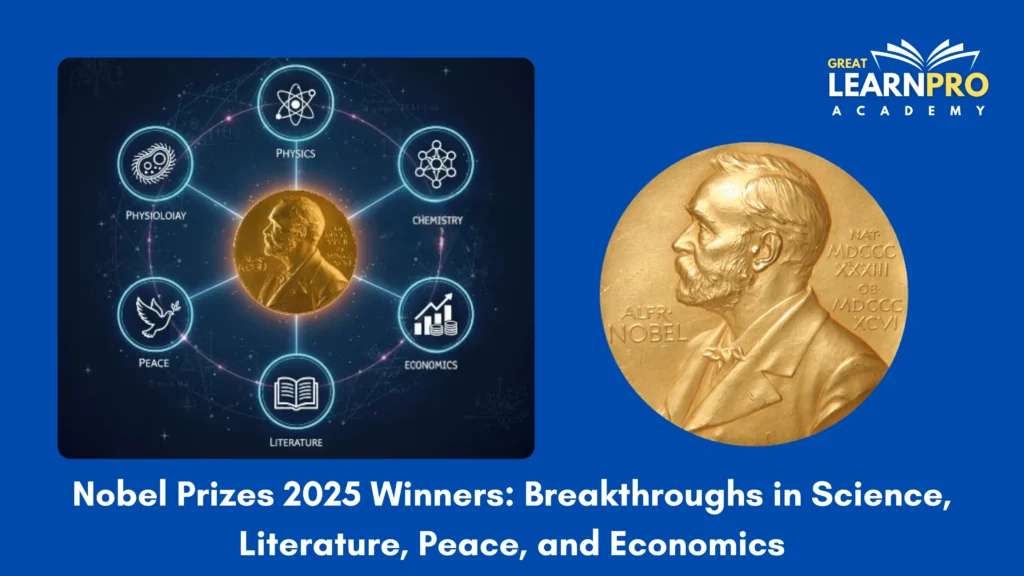The Nobel Prizes for 2025 celebrated remarkable achievements in science, literature, economics, and peace — each reflecting the challenges and aspirations of our time. From groundbreaking discoveries in quantum physics and immune regulation to the defense of democracy and art’s confrontation with despair, this year’s laureates embody the enduring pursuit of truth, courage, and creativity in an uncertain world.

Physiology or Medicine
The Nobel Prize in Physiology or Medicine was awarded to Mary E. Brunkow, Fred Ramsdell, and Shimon Sakaguchi for their pioneering work on peripheral immune tolerance. Their discoveries on how regulatory T cells (Tregs) prevent the immune system from attacking the body’s own tissues have transformed the understanding of autoimmune diseases. This breakthrough has opened new pathways for treating conditions like Type 1 diabetes, multiple sclerosis, and rheumatoid arthritis, while advancing cancer immunotherapy by finding ways to fine-tune immune responses.
Physics
The Nobel Prize in Physics recognized John Clarke, Michel H. Devoret, and John M. Martinis for demonstrating macroscopic quantum mechanical tunneling and energy quantisation in electric circuits. Their work bridged the gap between the microscopic and macroscopic worlds, proving that quantum mechanics governs even large systems. These findings have laid the foundation for the emerging field of quantum computing, which promises revolutionary advances in secure communication and information processing.
Chemistry
The Nobel Prize in Chemistry went to Susumu Kitagawa, Richard Robson, and Omar M. Yaghi for their development of metal-organic frameworks (MOFs). These highly porous crystalline materials can trap, store, and separate molecules with unprecedented precision. MOFs have wide-ranging applications — from capturing carbon dioxide and purifying water to storing hydrogen fuel and harvesting atmospheric moisture. The discovery is a milestone for sustainable technology, offering solutions to some of humanity’s most pressing environmental challenges.
Literature
Hungarian novelist László Krasznahorkai received the Nobel Prize in Literature “for his compelling and visionary oeuvre that, in the midst of apocalyptic terror, reaffirms the power of art.” Known for his complex narratives and existential depth, Krasznahorkai’s novels, such as Satantango and The Melancholy of Resistance, explore despair, faith, and the decay of modern life. His writing evokes a haunting sense of human endurance — suggesting that art, even when confronting darkness, remains a vital form of resistance.
Peace
The Nobel Peace Prize 2025 was awarded to Venezuelan opposition leader María Corina Machado for her steadfast commitment to democracy and human rights. Despite persecution, bans, and imprisonment threats, she has become a symbol of peaceful resistance against authoritarianism. Her recognition by the Nobel Committee highlights the global importance of defending democratic values in an era marked by rising populism, disinformation, and suppression of dissent.
Economic Sciences
The Nobel Prize in Economic Sciences was shared by Joel Mokyr, Philippe Aghion, and Peter Howitt for their influential research on innovation and creative destruction. Their work explains how technological change drives long-term economic growth, while also generating social disruption. They emphasized the role of policies that promote innovation, competition, and adaptability. In a world grappling with automation, inequality, and economic transitions, their ideas resonate powerfully with contemporary debates on sustainable growth and equitable development.
Themes & Global Resonance
Balancing Innovation and Stability
Several 2025 laureates highlight the delicate balance between innovation and stability. The physicists and chemists redefined how humans harness quantum and molecular structures, while the economists explored how societies can manage disruption without leaving vulnerable groups behind. Together, they illustrate that progress must evolve hand in hand with social responsibility.
Tolerance — Biological, Political, and Moral
The Medicine and Peace Prizes both revolve around the theme of tolerance. The discovery of immune tolerance mirrors the need for political and social tolerance in democratic societies. Just as the immune system must recognize and respect its own cells to function, societies too must protect the voices and rights within them.
Art as Resistance
Krasznahorkai’s Nobel in Literature reinforces the timeless power of art. His writing, though steeped in melancholy, reaffirms that artistic expression can confront chaos and despair with meaning and imagination. Art remains the conscience of civilization — questioning, enduring, and revealing what science and politics often cannot.
Innovation for Humanity
The Chemistry and Economics prizes show that innovation must serve humanity’s long-term well-being. Metal-organic frameworks could reshape environmental policy, while the economic theories of creative destruction remind leaders that progress without inclusion breeds inequality.
What It Means Moving Forward
The Nobel Prizes 2025 collectively reflect a world in flux one where science strives to repair, art seeks to understand, and courage defends freedom. These awards remind us that knowledge and conscience must evolve together. Whether it is immune tolerance, democratic resilience, or quantum logic, each discovery and act of defiance echoes a single truth: that human progress depends not only on intelligence but on integrity.
As we move deeper into an era defined by climate stress, political divisions, and technological leaps, the message of the Nobel Prizes 2025 is unmistakable the future must be guided by empathy, inquiry, and courage. Innovation without ethics, or power without compassion, will not sustain humanity. But as these laureates show, the pursuit of truth and justice continues to light the way forward.
Sources:
- https://indianexpress.com/article/world/american-scientists-john-clarke-michel-devoret-and-john-martinis-win-physics-nobel-prize-10292942/?utm_
- https://indianexpress.com/article/world/american-scientists-john-clarke-michel-devoret-and-john-martinis-win-physics-nobel-prize-10292942/?utm_
- https://www.reuters.com/world/mokyr-aghion-howitt-win-2025-nobel-economics-prize-2025-10-13/?utm_
- https://www.britannica.com/topic/2025-Nobel-Prize-Winners?utm_
More Current affairs: https://learnproacademy.in/updates/
